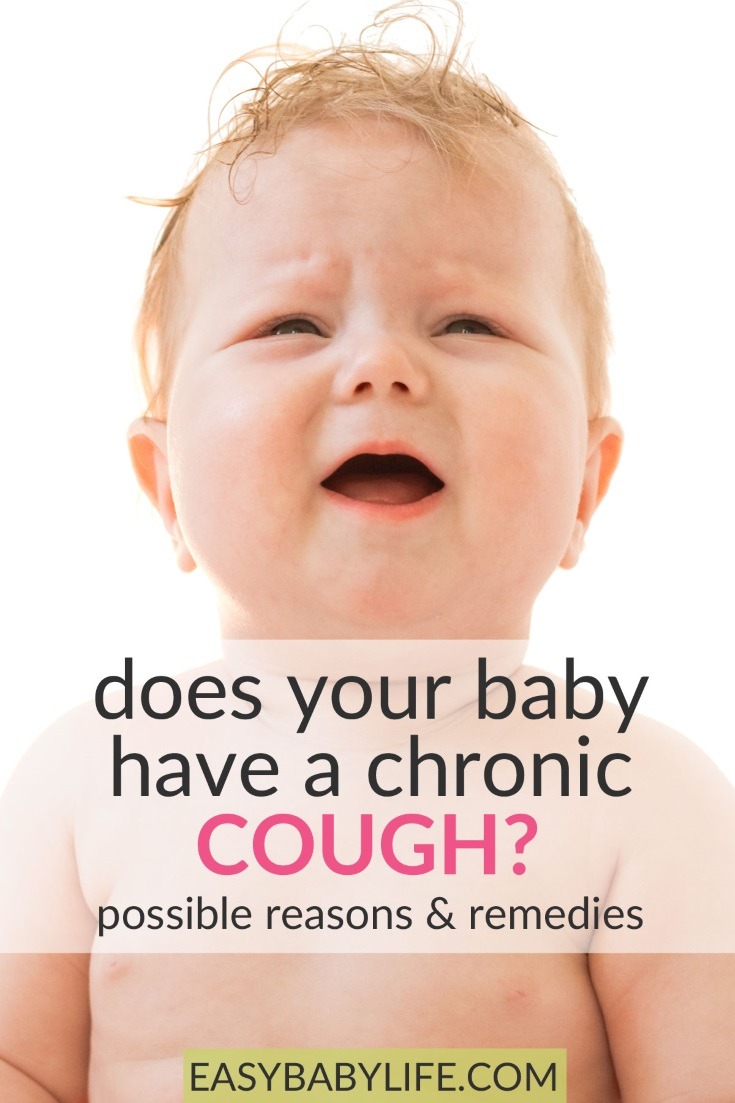Does your baby have a chronic cough?
Let’s take a look at a number of important reasons, the symptoms, and possible remedies for a persistent cough in babies.
Mom’s Question:
I have a 7-month-old who has had a cough for 1.5 months now. I had him to the Dr after three weeks, and we tried a course of Amoxicillin for ten days, but it didn’t clear up the cough totally.
The Dr thought he may have allergies, so we are trying a cold mist humidifier in our bedroom at night. He continues to cough and is congested in the morning. He coughs up phlegm in the morning. I have also sprayed an allergy spray on our blankets, carpets, and pillows to alleviate some allergens.
What other home remedies should I try?
Thanks,
Tammy
Reasons & Remedies for Chronic Cough in Baby
6 weeks of persistent cough is a long time for a baby, and you did the right thing to seek advice after three weeks. Unfortunately, the Amoxicillin (an antibiotic) didn’t help and it is now time for the next step.
First of all, do you know what triggered the cough in the first place? Did your son have any other symptoms like a cold? Sometimes, a cough takes longer to resolve than a cold. But if your child is not showing other signs and symptoms of illness, it is not much to worry about.
Definition of Chronic Cough
As a start, it is important to know what is defined as a chronic cough vs an acute cough.
A cough can be considered chronic when it has been going on for more than 2 weeks. Anything under 2 weeks is still considered acute.
Signs and symptoms associated with chronic cough
- Frequent sneezing – this is usually associated with allergic rhinitis and sinusitis. This usually leads to post nasal drip and nasal congestion, later on resulting to cough.
- Post nasal drip – this can also be attributed to allergic rhinitis and sinusitis. Mucus from the sinuses can elicit a cough reflex.
- Shortness of breath -frequent coughing can lead to shortness of breath when it occurs non-stop.
- Frequent throat clearing – sometimes, children complain of itchy throat and postnasal drip, resulting them in trying to clear their throats frequently.
- Sore throat – this can also cause cough as they try to soothe their throats.
Possible Reasons for Chronic Cough in Babies
1. Allergies
Allergies can be manifested as a lot of things. Rashes, redness, hives, frequent sneezing, nasal congestion, swelling of the eyes and face, swelling of throat and air passage, for more serious conditions. Another manifestation is cough. A cough reflex acts as a way of expelling anything that is stuck in the throat.
Usually, when a cough is caused by allergies, this is usually accompanied by other signs and symptoms such as colds or runny nose, teary eyes, or frequent sneezing.
2. Chronic Sinusitis
Chronic Sinusitis is an infection of the sinuses that goes on for a long time (symptoms reaching up to 12 weeks). This can cause mucus to drain to the back of the throat (post nasal drip) and can result to a cough reflex. Other associated symptoms include facial pain (sinuses) and nasal discharges.
3. Bronchiolitis
Bronchiolitis is the inflammation of the smaller airway passage known as bronchioles and is usually caused by the respiratory syncytial virus (RSV), which you probably heard of. This virus causes a simple cold in kids older than 3 years, but it can be very dangerous and even life threatening for babies as it can penetrate their lungs.
Your baby seems to be way too healthy for this to be a reason! Other signs and symptoms include colds, shortness of breath, or difficulty of breathing. This is common during the winter season or cold months.
4. Post nasal drip from sinusitis
Post nasal drip from sinusitis can cause a cough reflex as the child tries to expel the mucus draining at the back of their throats. Decongestants and anti-histamines work for postnasal drip. But the cause for postnasal drip should be addressed to ultimately eliminate and prevent the coughing.
5. Acid reflux
The lower esophageal sphincter of babies and young children are usually underdeveloped, hence acid reflux is common in this age. The acid backflows into the esophagus, causing an irritation to the esophagus and throat, eliciting a cough. The most common acid reflux symptoms are more related to excessing vomiting and pain, but the chronic cough can be a symptom too.
6. Asthma
The hallmark of Asthma is the swelling of the airway passage, causing wheezing, cough, and sometimes, difficulty in breathing. For acute exacerbations of asthma, it usually starts with a cough, later on progressing to wheezing (swelling of airways). Wheezing is more apparent during expiration, and is an indication of the onset of tightening of the airways.
Bronchodilators are usually used for asthma.
7. Foreign body ingestion
Foreign body ingestion can also cause coughing. A baby will try to expel anything that blocks his airway by coughing. Is it possible that your baby breathed in something that is now stuck? It is probably unlikely for this long time, but some type of smaller blockage could result in a cough too.
8. Whooping cough
Whooping cough or pertussis is another possible reason for persistent coughing, but your baby should be quite ill in such a case. The type of cough is uncontrollable and consecutive in pertussis. This can be avoided by having your child vaccinated against the bacterium causing pertussis (Bordetella).
9. Cystic Fibrosis
Cystic Fibrosis is a rare disease that is tested for in newborns. This is a progressive lung disease that is associated with frequent lung infections. This is most commonly associated with chronic cough.
If your baby is also experiencing poor weight gain, despite eating normally, is often constipated and has a salty taste to his skin, running a simple test for cystic fibrosis might be a reasonable thing to do. But if your baby has already tested for this and is overall healthy and thriving, this too is nothing to worry about!
How to Help Baby with Chronic Cough
I really don’t think you should settle with “maybe allergy” as an answer from your son’s doctor. Require further investigation!
What you can do at home in addition to the humidifier are to:
- Raise the head end of your son’s bed to ease his breathing at night.
- Use only a very mild washing powder, soap, and shampoo.
- Sometimes, a warm bath in humid, moist air can help. Try it before bedtime to see if it makes him sleep better.
- Think back if you bought any particular flowers or plants before the cough started. Then check if any of them are very allergenic, and in such case get rid of them.
- A chronic cough can also be a symptom of cow’s milk allergy, so if you have introduced cow’s milk to your son, consider reversing that and see if it helps. (You can read more about the symptoms of milk protein allergy here.)
- If any allergies run in the family, discuss those with the doctor as well.
- You can also give your baby some probiotics suitable for babies, to help to boost his immune system.
- Get your child vaccinated. Getting rid of vaccine-preventable diseases can definitely eliminate those unwanted viruses and bacterium that may cause unwanted diseases.
Otherwise, I believe your baby will outgrow the cough sooner or later.
I hope this helps,
Paula
More Coughing Babies
References
Find comments below.
Comments |
||
|
||
|
||
|
||
|
||
|
||
|
||
|
||
|
||
|
||
|
||
|
||
|
||
|
||
|
||
|
||
|
||
|
||
|
||

Paula Dennholt founded Easy Baby Life in 2006 and has been a passionate parenting and pregnancy writer since then. Her parenting approach and writing are based on studies in cognitive-behavioral models and therapy for children and her experience as a mother and stepmother. Life as a parent has convinced her of how crucial it is to put relationships before rules. She strongly believes in positive parenting and a science-based approach.
Paula cooperates with a team of pediatricians who assist in reviewing and writing articles.





